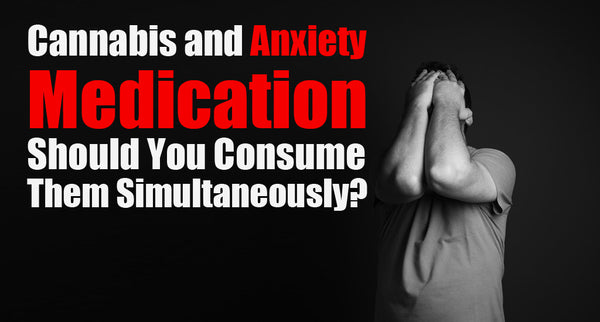
Unlocking Better Sleep: A Guide to Using Cannabis Wisely to Improve Sleep Quality
In the last few years, the world has faced unexpected and new problems. These problems affect jobs, schools, and health care a lot. Many people don't have jobs now. This makes many people feel very stressed. Before all this, a lot of American adults, between 33 and 49 million, had trouble sleeping. Now, with all these problems affecting many lives, more people probably have trouble sleeping.
Because of this, many adults are trying cannabis to relax and sleep better. But not all cannabis is the same. It's important to know which type and how to use it to help you the best way.
Understanding the Different Components of Marijuana
CBD, CBN, and THC
CBD (cannabidiol), CBN (cannabinol), and THC (tetrahydrocannabinol) are three terms we often use when discussing marijuana. They're all components found in the plant, and there are more than a hundred of these components (though these three are the most well-known). Each of them has its unique name and qualities that set it apart, such as its taste, strength, and aroma.
When you're selecting a type of marijuana, it's crucial to consider the amounts of CBD, THC, and CBN it contains. Unlike what people commonly associate with marijuana, like red eyes, slow reactions, and increased appetite, CBD doesn't give you a "high." Those effects are actually caused by THC, which is responsible for the "high" sensation. Both CBD and THC can aid in improving sleep. CBD is often helpful for anxiety, while THC can reduce intense dreaming.
Related article: THC and CBD, and the Entourage Effect!
Another component of marijuana is CBN, which can also assist with sleep. If you're seeking something to help you sleep, it's worth checking whether it contains CBN. CBN isn't as potent as THC in creating a "high," but it can induce a sense of calmness and deep contemplation. Researchers are still trying to determine if it affects everyone the same way, so it's important to be cautious the first time you try it. CBN can help you fall asleep, stay asleep, and additionally provide relief from pain and anxiety.
Enhancing Your Cannabis Experience
Exploring the Influence of Terpenes
When choosing your cannabis product, it's essential to consider terpenes. Terpenes are special-smelling compounds found in many plants like oranges, lavender, and pine. They're most linked with cannabis due to its unique scent. Now, there are over 100 different terpenes, and you can pick them based on how they affect you. Some terpenes that can be really helpful (and popular) include:
-
Mc (myrcene) stands out as the predominant terpene found in commercially available cannabis products. Its prominent presence contributes to the distinct calming and soothing effects often associated with cannabis use. Known for its earthy and herbal aroma, myrcene enhances the overall sensory experience of consuming cannabis. By promoting relaxation and a sense of calm, myrcene enriches the potential benefits of cannabis consumption, making it a sought-after terpene for those seeking relaxation and stress relief.
-
Ln (linalool) offers a mild sedative quality, rendering it a valuable tool for addressing sleep-related issues like insomnia. Its tranquilizing effects make it an appealing option for individuals seeking improved sleep quality and restfulness. Characterized by a delicate and floral fragrance, linalool adds a pleasant sensory dimension to cannabis products. Its potential to alleviate insomnia showcases its significance in promoting better sleep patterns. This makes linalool an intriguing component for those looking to enhance their relaxation and manage sleep disturbances effectively.
-
Lm (limonene) emerges as a noteworthy terpene with remarkable stress and anxiety-reducing properties, making it a valuable asset for emotional well-being. Its citrusy aroma not only pleases the senses but also complements its potential therapeutic effects. By harnessing limonene's calming influence, individuals can potentially experience relief from stress and anxiety, enhancing their overall mental state. This terpene's dual ability to provide emotional support and deliver a pleasing sensory experience underscores its significance in cannabis products geared towards promoting relaxation and emotional balance, offering a natural remedy for those seeking a soothing and revitalizing effect.
Related article: What are cannabis terpenes and what do they do?
You might find it interesting that terpenes interact with cannabinoids, which is called the entourage effect. This means that terpenes and cannabinoids can work together or against each other to create a certain feeling. For instance, if you combine terpenes that help you relax with cannabinoids that make you sleepy, you'll feel even more relaxed.
On the other hand, if you mix an energizing terpene with a cannabinoid that's supposed to relax you, neither will work well. Sometimes these opposite effects can be good—combining Pn (pinene) with THC can actually counteract the memory problems caused by THC. It's all about discovering which combinations are best for you and making the most of cannabis's benefits.
Exploring the Stages of Sleep: Understanding Your Restful Journey
While for many, falling asleep seems as simple as lying down and closing your eyes, there are those who struggle with insomnia and other sleep problems. Sleep itself is made up of four stages:
-
N1: This is when you're just starting to fall asleep. It lasts around 5 to 10 minutes and is when your heart rate slows down and your body gets ready for sleep (sometimes causing twitches). You can be easily woken up during this stage.
-
N2: In this stage, your body and brain fully relax. Your body temperature drops a bit, and your eye movements stop. The first N2 phase lasts from 10 to 25 minutes and gets longer as the night goes on. About half of your total night's sleep is in N2.
-
N3: This is the deep, restorative sleep phase. It's hard to wake someone up from this stage, and doing so can actually be bad for their health. N3 sleep goes on for 10 to 60 minutes and is when your body repairs itself. It can also boost your immune system, which is really important, especially nowadays.
-
REM: This is when you dream. Your body experiences atonia, a temporary paralysis of most muscles except the eyes and the ones used for breathing, while your brain activity increases, almost like you're awake. Cannabis can help with sleep issues during this stage, like sleep paralysis and chronic nightmares.
Improving Sleep with Cannabis: Tips and Benefits
Cannabis can offer support for various sleep problems like sleep paralysis, insomnia, and chronic nightmares. CBD can help calm your mind and body, while THC might reduce REM sleep time. Lowering REM sleep can prevent sleep paralysis, where you wake up but can't move. By reducing dreaming, which mostly happens in REM, people with chronic nightmares may sleep better and maintain their sleep cycle, leading to feeling more refreshed upon waking. Both CBD and THC relax you, aiding sleep and combating insomnia.
Even without sleep disorders, cannabis before bedtime can enhance overall sleep quality. To maximize its effects:
-
Set the mood: Dim the lights, get comfy in bed, and consider using a lavender essential oil diffuser (avoid candles to prevent oversleeping).
-
Relaxing sounds: Play calming music or watch a favorite show. Platforms like Spotify and YouTube have soothing playlists, and shows like "The Office" are great for winding down.
-
Choose the right product: A balanced CBD and THC blend works best—excessive CBD can hinder REM sleep, while too much THC might cause anxiety. Opt for an Indica-dominant strain.
-
Meditate: Combine meditation with cannabis for a recipe for restful sleep. Meditation before bed eases relaxation and pairs well with marijuana's effects.
What To Ask Your Dispensary
When buying marijuana for the first time, many individuals often feel anxious or unsure about what to request. There are several factors to consider when acquiring cannabis to enhance your sleep:
1. Which Product Should I Choose?
If you're new to this, it's best to start with vaping or using a tincture. Your dispensary should explain how to use what you're getting—make sure they know their stuff and that it's beginner-friendly.
Quickly and simply, here are the different strains you will be looking for:
- Indica brings relaxation.
- Sativa brings energy and alertness.
- Hybrids are a mix—some lean more towards Indica, others to Sativa.
Related article: How to choose marijuana strains - Marijuana strain guide
To enhance your sleep quality, opt for strains like pure Indica or hybrids primarily composed of Indica. These strains are known for their calming effects and are likely to promote a more restful slumber.
On the other hand, using Sativa strains for sleep is comparable to creating a stimulating environment by illuminating all lights and playing loud music—this can hinder relaxation and make falling asleep more challenging due to its energizing properties. Hence, it's wise to choose strains that align with your sleep goals, ensuring a peaceful and rejuvenating rest.
2. What’s the THC-to-CBD-to-CBN ratio?
Due to its psychoactive nature, THC can sometimes lead to heightened feelings of anxiety or paranoia, particularly for those sensitive to its effects. Therefore, it's essential to consider the THC-to-CBD or THC-to-CBN ratio in your chosen cannabis product. If the THC content surpasses that of CBD or CBN, there's a possibility that it might exacerbate anxiety rather than alleviate it. To ensure a calming experience, it's crucial to find a balance that works for you.
For individuals who often find themselves restless and plagued by overthinking when trying to sleep, prioritizing a higher CBN or CBD concentration in your product could prove more advantageous. These compounds possess relaxing properties that can contribute to a more tranquil and peaceful sleep. By selecting a strain or product with a well-suited ratio of these components, you're more likely to achieve a restful night's sleep without the interference of anxious thoughts or restlessness.
Remember, the key is understanding your body's response and seeking guidance from your dispensary to discover the right blend that aligns with your individual needs and promotes a sense of calmness and ease before bedtime.
3. What terpenes are in this product?
This information is important for a couple of reasons. First, if you're looking for better sleep, it's smart to choose a product with terpenes that help you relax. It's also crucial to make sure that the terpenes in your chosen product work well together with the cannabinoids (remember the entourage effect we talked about?). As a quick reminder, here are some well-known terpenes that can help you relax:
- Mc (myrcene)
- Ln (linalool)
- Lm (limonene)
Your dispensary should be able to guide you even if they don't have these exact terpenes (which they should since these are quite popular). If the dispensary staff doesn't understand what you mean, it might be a good idea to find a different place that knows more about these things. They should be able to assist you in finding the right product to meet your needs.
Conclusion
Now you're ready to start your path to improving your sleep! It's important to buy cannabis legally from a dispensary and gather all the details about the product you're getting. If you have serious concerns about your sleep issues, it's a good idea to talk to your doctor before making any choices or if you find that using marijuana doesn't provide the help you expected.
Apart from that, remember to be responsible and cautious, and then you can look forward to experiencing a peaceful night's rest. Taking these steps ensures you're making informed decisions that prioritize your well-being and safety. So, stay informed, make wise choices, and savor the benefits of a truly refreshing sleep routine.
About the Author
Emma Kaserkie is a full-time student, writer, and lover of Marvel movies. She spends most of her time ignoring her responsibilities in favor of reading, learning global geography, and finding new ways to prepare instant noodles. She lives with her parents and sister and a very needy dog named Eloise.



